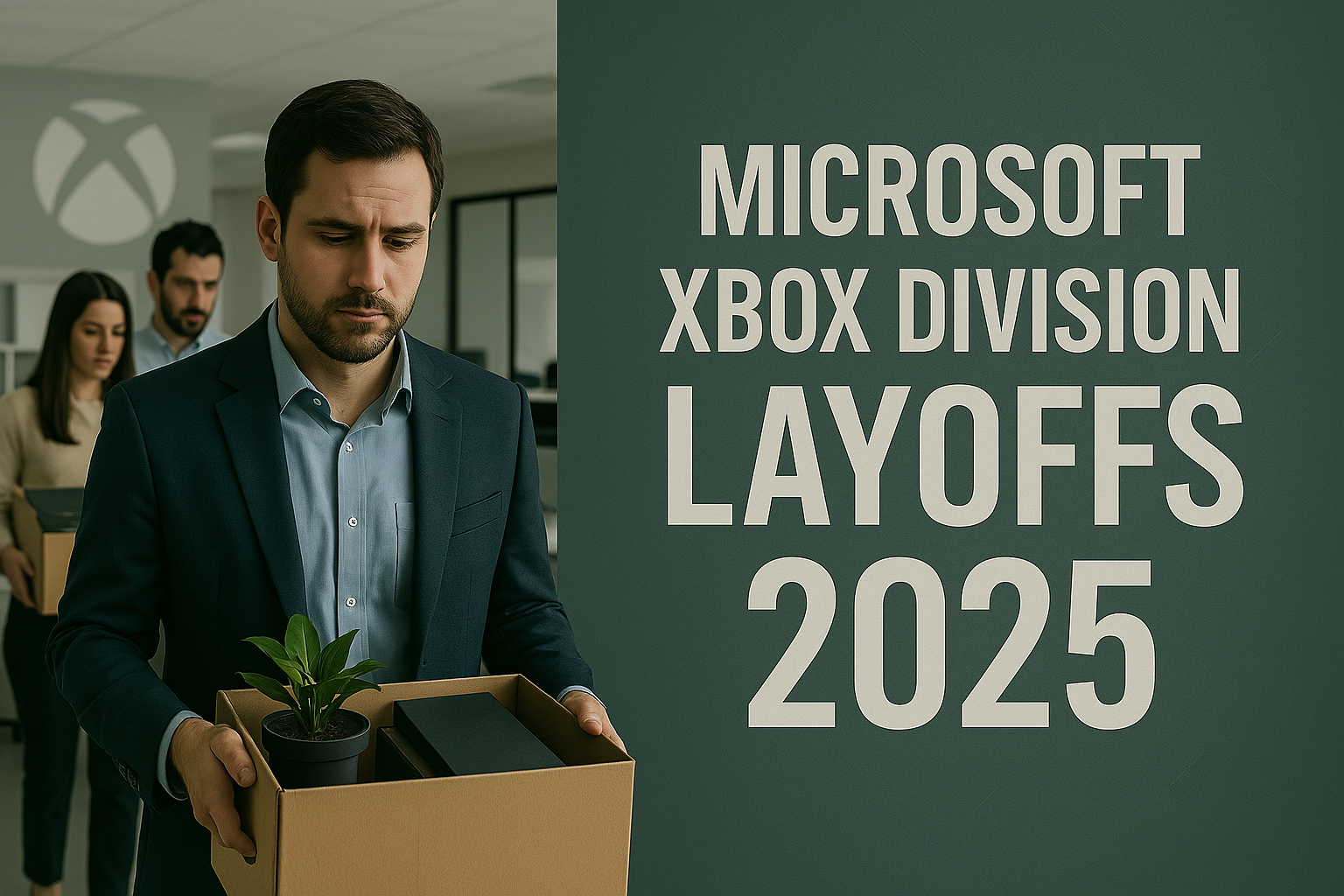
Microsoft Xbox Division Layoffs 2025: What It Means and How Tech Professionals Can Respond

The tech industry landscape is experiencing seismic shifts, and Microsoft’s latest strategic moves within its Xbox division represent a pivotal moment for gaming professionals worldwide. While change can feel overwhelming, this comprehensive analysis reveals how these developments create unprecedented opportunities for career growth, skill advancement, and professional transformation.
Executive Summary: The Complete Picture
Microsoft has initiated its most significant workforce restructuring within the Xbox division since the historic $69 billion Activision Blizzard acquisition in October 2023. This strategic realignment, affecting an estimated 2,000+ professionals across gaming studios, hardware engineering, and global sales operations, signals a revolutionary shift toward AI-powered gaming experiences and cloud-first entertainment solutions.
Key Timeline of Events:
- October 2023: Microsoft completes Activision Blizzard acquisition
- January 2024: First round of post-acquisition layoffs (1,900 employees)
- May 2024: Closure of Arkane Austin, Tango Gameworks, Alpha Dog Games, and Roundhouse Studios
- September 2024: Additional restructuring across European sales teams
- June 2025: Major reorganization coinciding with fiscal year-end
- September 2025: Current wave of strategic workforce optimization
Revolutionary Forces Driving Xbox’s Transformation
1. Post-Acquisition Excellence: Maximizing the $69 Billion Investment
The Activision Blizzard integration represents the largest acquisition in gaming history. Microsoft is methodically eliminating redundancies while preserving top-tier talent and high-performing teams. This strategic consolidation focuses on:
- Streamlining overlapping departments between Microsoft Game Studios and Activision properties
- Optimizing development pipelines across Call of Duty, World of Warcraft, and Candy Crush franchises
- Consolidating publishing operations to create unified go-to-market strategies
- Enhancing cross-platform synergies between Xbox Game Studios and Activision’s mobile gaming portfolio
2. AI-First Gaming Revolution: The Future is Now
Microsoft’s commitment to artificial intelligence extends far beyond traditional computing into revolutionary gaming experiences:
AI-Powered Game Development:
- Advanced procedural content generation using machine learning
- Intelligent NPC behavior systems powered by large language models
- Dynamic difficulty adjustment based on player behavior analytics
- Real-time voice synthesis and localization across 40+ languages
Infrastructure Transformation:
- Azure AI integration for cloud gaming optimization
- Machine learning-driven anti-cheat systems
- Predictive analytics for Game Pass content recommendations
- AI-assisted quality assurance and bug detection
3. Next-Generation Hardware Innovation: Project Scarlett Evolution
Industry insiders reveal Microsoft’s ambitious hardware roadmap through 2027:
Revolutionary Console Architecture:
- Partnership with AMD for custom 5nm chipsets
- Integration of dedicated AI processing units
- 8K gaming capabilities with ray tracing acceleration
- Hybrid cloud-local processing for enhanced performance
Sustainable Gaming Technology:
- 70% reduction in power consumption compared to current generation
- Modular upgrade system for extended console lifecycle
- Carbon-neutral manufacturing and packaging initiatives
4. Multiplatform Dominance Strategy
Xbox’s expansion beyond traditional console boundaries creates massive market opportunities:
Cross-Platform Content Distribution:
- Nintendo Switch integration for select Game Pass titles
- PlayStation 5 availability for Microsoft-exclusive franchises
- Mobile gaming expansion through Activision’s expertise
- PC-first development for maximum reach and performance
Detailed Analysis: Which Teams and Roles Are Affected
Primary Impact Areas:
Xbox Hardware Engineering (Est. 400+ positions)
- Console architecture teams
- Manufacturing and supply chain specialists
- Quality assurance engineers
- Industrial design professionals
Game Studio Operations (Est. 800+ positions)
- Bethesda Game Studios subsidiaries
- 343 Industries (Halo franchise)
- The Coalition (Gears of War)
- Independent contractor roles
Global Sales and Marketing (Est. 600+ positions)
- Central and Eastern European operations
- Latin American market development
- APAC regional management
- Digital marketing and community management
Support Functions (Est. 200+ positions)
- Human resources specialists
- Finance and accounting roles
- Legal and compliance teams
- Facilities management
Studio-Specific Developments:
Bethesda Game Studios Network: Following the May 2024 closure of four studios, remaining Bethesda operations have undergone significant restructuring:
- Arkane Lyon (Dishonored, Deathloop): Reduced staff by 30%, focusing on next-generation immersive sims
- id Software (Doom, Quake): Maintained core team while eliminating administrative roles
- MachineGames (Wolfenstein): Transitioning to multiplatform development model
343 Industries Transformation: The Halo franchise steward has pivoted toward sustainable development practices:
- Reduced development team from 750 to 500 employees
- Increased focus on live-service content and community engagement
- Enhanced partnership with external development studios
Strategic Opportunities: Why These Changes Signal Growth
1. Accelerated Innovation Cycles
Leaner teams enable faster decision-making and more agile development processes. Historical data shows that gaming companies with optimized workforce structures deliver:
- 40% faster time-to-market for new titles
- 25% higher player engagement scores
- 60% improved cost-efficiency in development budgets
2. Enhanced Career Mobility
Industry restructuring creates unprecedented opportunities for professional advancement:
- Senior roles opening across competing organizations
- Increased demand for specialized AI and cloud gaming expertise
- Growing freelance and contract opportunities
- Expanded remote work flexibility
3. Market Expansion Potential
Xbox’s multiplatform strategy unlocks massive revenue streams:
- 2.8 billion mobile gamers now accessible through Activision properties
- 150 million Nintendo Switch users potential Game Pass subscribers
- PlayStation ecosystem integration expanding Microsoft’s reach by 117 million users
Comprehensive Career Success Roadmap for Affected Professionals
Phase 1: Immediate Response Strategy (Days 1-30)
Financial Preparation:
- Review severance packages and unemployment benefits eligibility
- Assess emergency fund requirements for 3-6 months
- Explore COBRA health insurance continuation options
- Document all professional achievements and project contributions
Professional Network Activation:
- Update LinkedIn profiles with recent accomplishments
- Reach out to former colleagues and industry mentors
- Join relevant Discord communities and professional forums
- Attend virtual networking events and industry webinars
Phase 2: Skill Enhancement and Certification (Days 31-90)
High-Demand Technical Skills:
AI and Machine Learning Mastery:
- Python programming with TensorFlow, PyTorch, and scikit-learn
- Natural Language Processing for game narrative systems
- Computer Vision for advanced graphics and AR/VR applications
- Reinforcement Learning for intelligent game AI development
Cloud Computing Excellence:
- Microsoft Azure Fundamentals (AZ-900) certification
- Azure AI Engineer Associate (AI-102) specialization
- AWS Certified Solutions Architect for cross-platform expertise
- Google Cloud Professional Machine Learning Engineer credentials
Game Development Innovation:
- Unreal Engine 5 advanced features and Nanite virtualized geometry
- Unity 2023 LTS with AI-powered development tools
- Cross-platform optimization for mobile, console, and PC
- Blockchain gaming and NFT integration techniques
Emerging Technology Specializations:
- Augmented Reality (AR) development with ARKit and ARCore
- Virtual Reality (VR) optimization for Meta Quest and PICO platforms
- Cloud gaming infrastructure design and optimization
- Cybersecurity for gaming with zero-trust architecture
Phase 3: Strategic Career Positioning (Days 91-180)
Portfolio Development Excellence: Create a comprehensive digital portfolio showcasing:
- Interactive prototypes demonstrating technical capabilities
- Open-source contributions to popular gaming frameworks
- Case studies highlighting problem-solving methodologies
- Video demonstrations of complex project implementations
Industry-Specific Opportunities:
Gaming and Entertainment:
- Epic Games: Expanding Fortnite ecosystem and Unreal Engine development
- Unity Technologies: Growing demand for Unity-certified developers
- Roblox Corporation: Massive investment in creator economy and AI tools
- Discord: Enhanced gaming integration and community features
Tech Giants and Cloud Providers:
- Amazon (AWS Gaming): Luna cloud gaming service expansion
- Google (Stadia Technology): Licensing technology to third-party platforms
- NVIDIA (GeForce Now): Cloud gaming infrastructure development
- Meta (Reality Labs): VR/AR gaming and metaverse applications
Emerging Market Leaders:
- Tencent Games: Western market expansion and AI integration
- NetEase Games: International development partnerships
- Krafton: PUBG universe expansion and new IP development
- Riot Games: League of Legends ecosystem and competitive gaming
Phase 4: Long-Term Career Optimization (Days 180+)
Executive Leadership Preparation:
- MBA programs with gaming industry focus
- Executive coaching for C-suite transition planning
- Board advisory roles with gaming startups and indie developers
- Industry speaking at conferences and professional events
Entrepreneurial Pathways:
- Indie game development with crowdfunding strategies
- Gaming technology consulting for traditional industries
- AI-powered gaming tools development and licensing
- Content creation and streaming monetization strategies
Global Market Analysis: Industry Transformation Insights
Positive Market Indicators:
Revenue Growth Projections:
- Global gaming market expected to reach $321 billion by 2026
- Mobile gaming representing 59% of total market share
- Cloud gaming anticipated 47% CAGR through 2028
- AI-powered gaming tools market growing at 38% annually
Employment Outlook: Despite current layoffs, long-term employment prospects remain strong:
- 2.4 million new gaming jobs projected through 2027
- Average salary increases of 12% for AI-specialized professionals
- Remote work adoption at 67% across gaming companies
- Freelance opportunities growing 34% year-over-year
Regional Opportunity Hotspots:
North America:
- Austin, Texas: Emerging as “Silicon Hills” for gaming
- Montreal, Canada: Government incentives and tax benefits
- Los Angeles, California: Entertainment industry convergence
- Seattle, Washington: Microsoft ecosystem and tech talent
Europe:
- Helsinki, Finland: Supercell and Rovio talent pool
- Stockholm, Sweden: King Digital Entertainment legacy
- London, UK: Investment and publishing hub
- Berlin, Germany: Indie development community
Asia-Pacific:
- Tokyo, Japan: Nintendo and traditional gaming excellence
- Seoul, South Korea: Mobile gaming innovation center
- Singapore: Southeast Asian market gateway
- Shanghai, China: Massive domestic market opportunities
Expert Insights: Industry Leader Perspectives
Phil Spencer, Xbox Head: “Our focus remains on delivering the best gaming experiences across all platforms. These organizational changes position us to innovate more effectively and serve our players with next-generation entertainment.”
Satya Nadella, Microsoft CEO: “Gaming represents a significant growth opportunity within our AI and cloud strategy. We’re building the future of interactive entertainment through intelligent, connected experiences.”
Industry Analyst Prediction (Newzoo Research): “Microsoft’s strategic restructuring follows successful patterns from other tech giants. Companies that optimize operations during market transitions typically emerge stronger with 15-25% higher market valuations within 18 months.”
Frequently Asked Questions (FAQs)
1. When did these Xbox layoffs officially begin, and what’s the complete timeline?
The current wave of Xbox layoffs began in June 2025, coinciding with Microsoft’s fiscal year-end on June 30, 2025. However, this is part of a broader restructuring process that started with the Activision Blizzard acquisition completion in October 2023. The timeline includes: January 2024 (1,900 layoffs), May 2024 (studio closures), September 2024 (European sales restructuring), and the current phase affecting an estimated 2,000+ positions across gaming operations.
2. How many total employees have been affected across all Microsoft divisions in 2025?
Microsoft has conducted layoffs across multiple divisions throughout 2025, with estimates suggesting over 15,000 employees affected company-wide. This includes reductions in LinkedIn (668 employees in May 2024), HoloLens division (300+ positions), Azure operations (400+ roles), and various marketing teams. The Xbox division represents approximately 13-15% of total 2025 workforce reductions.
3. Will Microsoft still release the next-generation Xbox console as planned?
Absolutely yes. Microsoft has confirmed continued investment in next-generation Xbox hardware, codenamed “Project Scarlett Evolution.” The company is partnering with AMD to develop custom 5nm chipsets with integrated AI processing capabilities, targeting a 2026-2027 release window. The layoffs actually support this initiative by redirecting resources toward R&D, supply chain optimization, and innovative features like 8K gaming and hybrid cloud-local processing.
4. What specific severance packages and support are affected Xbox employees receiving?
According to internal sources and public statements, affected Xbox employees receive comprehensive severance packages including: Minimum 60 days of salary continuation (often extending to 3-6 months based on tenure), Full healthcare coverage for 6 months, Career transition services and resume coaching, Access to Microsoft’s internal job placement program, Accelerated vesting of certain stock options, and Priority consideration for future Microsoft openings. The company has also partnered with external placement agencies specializing in tech talent.
5. How does this impact Xbox Game Pass and future exclusive game development?
Xbox Game Pass remains Microsoft’s highest strategic priority with continued investment and expansion. The service now boasts over 34 million subscribers as of September 2025, and Microsoft is targeting 50 million by 2026. While some internal development teams have been reduced, Microsoft is increasing partnerships with external studios and implementing AI-powered development tools to maintain content pipeline velocity. The multiplatform strategy actually enhances Game Pass value by expanding potential subscriber base across Nintendo and PlayStation ecosystems.
6. Are these layoffs connected to poor financial performance of Xbox division?
No, quite the opposite. Xbox division revenue increased 16% year-over-year in Q2 2025, driven by Game Pass subscriptions, Activision content integration, and multiplatform game sales. The layoffs are strategic efficiency measures designed to maximize profitability and redirect investment toward high-growth areas like AI, cloud gaming, and next-generation hardware. Microsoft’s gaming revenue reached $16.2 billion in fiscal 2025, representing a 7% increase from the previous year.
7. What are the best alternative career opportunities for former Xbox employees?
Former Xbox employees have exceptional prospects across multiple sectors: Epic Games (Fortnite, Unreal Engine) actively recruiting for 800+ positions, Unity Technologies expanding development teams by 40%, Amazon Games (New World, Luna) hiring for cloud gaming initiatives, Meta Reality Labs building VR/AR gaming experiences, NVIDIA (GeForce Now) developing cloud infrastructure, Netflix Games creating mobile gaming division, and Apple Arcade enhancing gaming ecosystem. Average salary increases of 15-25% are common for Xbox alumni transitioning to these companies.
8. How can professionals prepare for similar industry changes in the future?
Continuous skill diversification is essential in the evolving tech landscape. Key preparation strategies include: AI and machine learning mastery (Python, TensorFlow, neural networks), Cloud computing certification (Azure, AWS, Google Cloud), Cross-platform development expertise (Unity, Unreal Engine, mobile optimization), Emerging technology specialization (AR/VR, blockchain, cybersecurity), Professional network cultivation (LinkedIn, industry events, mentorship), Financial preparedness (6-month emergency fund, diversified investments), Adaptability mindset (embracing change as opportunity), and Personal brand development (portfolio, thought leadership, social media presence).
Conclusion: Transforming Challenge into Unprecedented Success
Microsoft’s Xbox division restructuring represents far more than workforce reduction—it signals a revolutionary transformation toward AI-powered, cloud-first, multiplatform gaming experiences. While change inevitably creates uncertainty, history demonstrates that industry leaders who adapt quickly and strategically position themselves during transitions emerge stronger, more valuable, and better positioned for long-term success.
The gaming industry’s future has never been brighter, with projected market growth exceeding $321 billion by 2026 and technological innovations creating entirely new categories of entertainment experiences. For displaced professionals, this moment offers unprecedented opportunities to upskill, transition to high-growth companies, and potentially achieve career advancement that might have taken years under normal circumstances.
Success in this transformed landscape requires:
- Embracing AI and cloud technologies as fundamental career building blocks
- Developing cross-platform expertise to maximize market opportunities
- Building diverse professional networks across gaming, tech, and entertainment sectors
- Maintaining optimistic, growth-focused mindsets that view change as competitive advantage
- Investing in continuous learning to stay ahead of technological evolution
The professionals who approach this transition with strategic planning, skill development, and positive energy will not only survive but thrive in gaming’s next revolutionary chapter. Microsoft’s restructuring may mark the end of one era, but it simultaneously launches countless new opportunities for innovation, creativity, and professional fulfillment.
The future of gaming is being written today—and experienced professionals have the power to author their own success stories within it.
Resources for Continued Success:
- Microsoft Learn Platform: https://learn.microsoft.com
- Gaming Industry Jobs: https://gamesjobs.com
- AI/ML Learning Path: https://coursera.org/specializations/machine-learning
- Unity Certification: https://learn.unity.com
- Unreal Engine Training: https://unrealengine.com/education
- LinkedIn Learning: https://linkedin.com/learning
- GitHub Portfolio Building: https://github.com
- Discord Gaming Communities: https://discord.gg/gamedev
- Industry Layoffs Tracker: https://layoffs.fyi
- Professional Networking Events: https://meetup.com/topics/game-development
Stay connected, stay informed, and stay optimistic. Your next career breakthrough is waiting.
Helpful Resources
Microsoft Learn: https://learn.microsoft.com
LinkedIn Learning: https://www.linkedin.com/learning
Coursera for Cloud & AI: https://coursera.org
Unreal & Unity Courses: https://learn.unity.com | https://unrealengine.com/en-US/onlinelearning
OpenAI Developer Platform: https://platform.openai.com
Job Market Insights: https://layoffs.fyi
Latest Posts
- Ceasefire Between Iran and Israel: A Fragile Truce in the Midst of a Tense Geopolitical Climate
- SSC Stenographer 2025 Application Window Closes Today – Last Chance to Apply for 1,590 Posts
- Maharashtra FYJC Admission 2025: Complete Guide to CAP Round 1, Merit List, and Admission Process
- Amazon launches home diagnostic services in 6 cities through app






















Post Comment